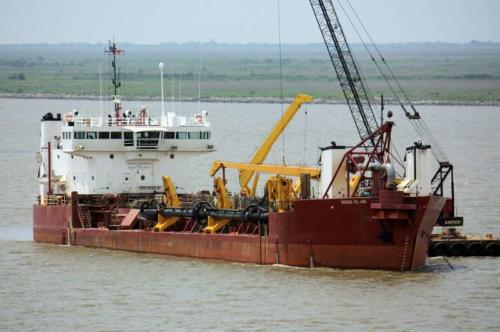Reviewing the situation
Lack of situational awareness can leave you high and dry - as Sam Pecota MNI knows from experience.
Situational Awareness, or SA, has been succinctly defined as “Knowing where YOU are and knowing where THEY are.” “THEY” are, of course, other vessels. We avoid other vessels through proper application of the Colregs, employing manual or automatic radar plotting methods, or even more basically, simply looking out the window every once in a while.
All this takes experience and some skill. However, when considering the determination of ownship’s position today, the process could hardly be more basic. Global Navigational Satellite Systems (GNSS), such as GPS, and ECDIS (ECS) have made position fixing so simple, a five-year-old could figure it out. Mariners in today’s industry who think they can derive any sort of satisfaction merely from determining one’s position at sea are kidding themselves. GNSS/GPS is such a reliable system that you could very nearly stake your life upon it anytime. Nearly so… The trouble is, navigating has become so easy under normal circumstances, that loss of SA in more challenging, or exceptionally difficult conditions can become terrifyingly common.
Staying engaged
The necessity of remaining actively interested in the vessel’s position enough to do more than glance occasionally and absentmindedly at the ECDIS screen is a constant battle for today’s mariners. Because it is so easy, we become complacent. When our electronics fail, as they most assuredly will at some time, we must be able to recognise the failure immediately and react accordingly.
If one has not been correlating the ECDIS display with radar (ranges, bearings, parallel indexing) and visual bearings plotted on the ECDIS or paper chart, or even simply looking casually at the scene passing by out the windows, a GNSS/GPS failure, even if discovered, can prove disastrous because the unfortunate mariner may not have time to recover from the loss of SA. The resulting grounding may produce anything from mild embarrassment to loss of career to loss of life and destruction of the environment.
When electronics fail - as they will - we must be able to react accordingly
A cautionary tale
The following example of loss of situational awareness is one I know intimately – it happened to me. As a young mate in March 1981, with four months seagoing experience, I ran a 100-metre hopper dredger aground in a storm off Beaufort Inlet, North Carolina. This incident took place ten years before the widespread introduction of GPS, but it involved overreliance on a short range positioning system used in dredging known as Trisponder. Of similar accuracy to GPS, Trisponder lulled young mates like myself into a false sense of security, precisely because of its accuracy and ease of use compared with more conventional fixing methods.
I had my hands full trying to manoeuvre the unwieldy vessel close to a shoal at night in horrible weather. I took for granted the positioning information given by Trisponder and neglected to correlate that information with the picture on radar (admittedly messy in the rough waters) or even with visual navigational aids in the area. I fixated on the Mylar roll moving across the track plotter to the exclusion of anything else of navigational relevance.
When the vessel grounded so hard on the shoal that I had to perform a radical manoeuvre to get her free, it took the vessel beyond the area marked on the Trisponder chart roll. Because I had not familiarised myself sufficiently with the area surrounding our work assignment, either visually or on the paper chart, once out of that area, and without Trisponder help, I was lost. The vessel was soon firmly aground (at high tide, no less) and I was unable to work her off before the ebb tide. There we remained, high and dry until the next high tide.
We made the nightly local TV news, which showed embarrassing aerial shots of the stranded vessel under the caption “Large barge grounds on Shackleford Shoal.” [Hopper dredgers are often mistaken for barges.] There wasn’t any damage to the ship fortunately, but twelve hours of operational time were lost. My ego was bruised but I kept hold of my job.
There is an old adage that it is best to learn from the mistakes of others. I heartily agree, but I also submit that learning from one’s own errors, assuming they are not fatal to life or career, is nevertheless quite effective too. I never made the same type of mistake again in the thirtysome years since that miserable night in North Carolina.

Striking the right balance
For more than twenty years, GNSS/GPS systems have been serving mankind faithfully and efficiently in all kinds of navigational tasks. It would be absurd to admonish today’s mariners never to trust GNSS/GPS because of the very few instances where it can fail due to a variety of causes. Still, it is the wise mariner who utilises satellite navigation systems with the words of US President Ronald Reagan always in mind, “Trust but Verify.” Cross-checking ECDIS or ECS positions with other navigational data not totally dependent on GNSS/GPS may be tedious, but is also vital for marine navigators to remain alert and ready to handle any primary navigation system failure. Maintaining an acceptable level of situational awareness depends on the frequent comparison of multiple position fixing sources as a matter of routine. And a routine situation is infinitely preferable to an emergency.
